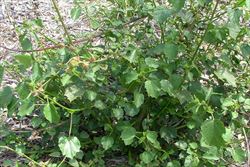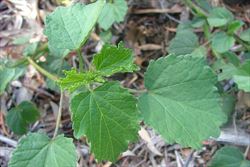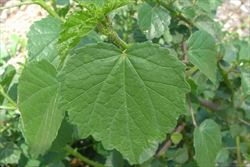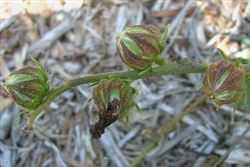Click on images to enlarge

habit (Photo: Sheldon Navie)

close-up of stem with numerous small prickles (Photo: Sheldon Navie)

leaves (Photo: Sheldon Navie)

close-up of leaf (Photo: Sheldon Navie)

old flower beginning to close (Photo: Sheldon Navie)

immature fruit (Photo: Sheldon Navie)

mature fruit (Photo: Sheldon Navie)

close-up of mature fruit with seeds (Photo: Sheldon Navie)
Scientific Name
Hibiscus diversifolius Jacq.
Family
Malvaceae
Common Names
swamp hibiscus, yellow hibiscus
Origin
Native to Africa (i.e. Ethiopia, Kenya, Tanzania, Uganda, Burundi, Cameroon, Congo, Rwanda, Senegal, Angola, Malawi, Mozambique, Zambia, Botswana and South Africa), Madagascar and Mauritius. Possibly native to south-eastern Asia and some islands in the western Pacific. Also considered to be native to the coastal districts of eastern Australia (i.e. the coastal districts of eastern Queensland and New South Wales) and Lord Howe Island.
Naturalised Distribution
Naturalised locally in south-western Western Australia (i.e. in Perth and surrounding areas).
Also naturalised on some Pacific islands (i.e. Fiji, Niue and the Galápagos Islands).
Notes
Swamp hibiscus (Hibiscus diversifolius) is regarded as an environmental weed in Western Australia, and was recently ranked as a moderately important species in the Environmental Weed Strategy of Western Australia. It has become naturalised on mud flats in the Swan River estuary and along creeks in the Darling Range. It is also occupying river banks, drains, grasslands and other disturbed natural vegetation in this region.

